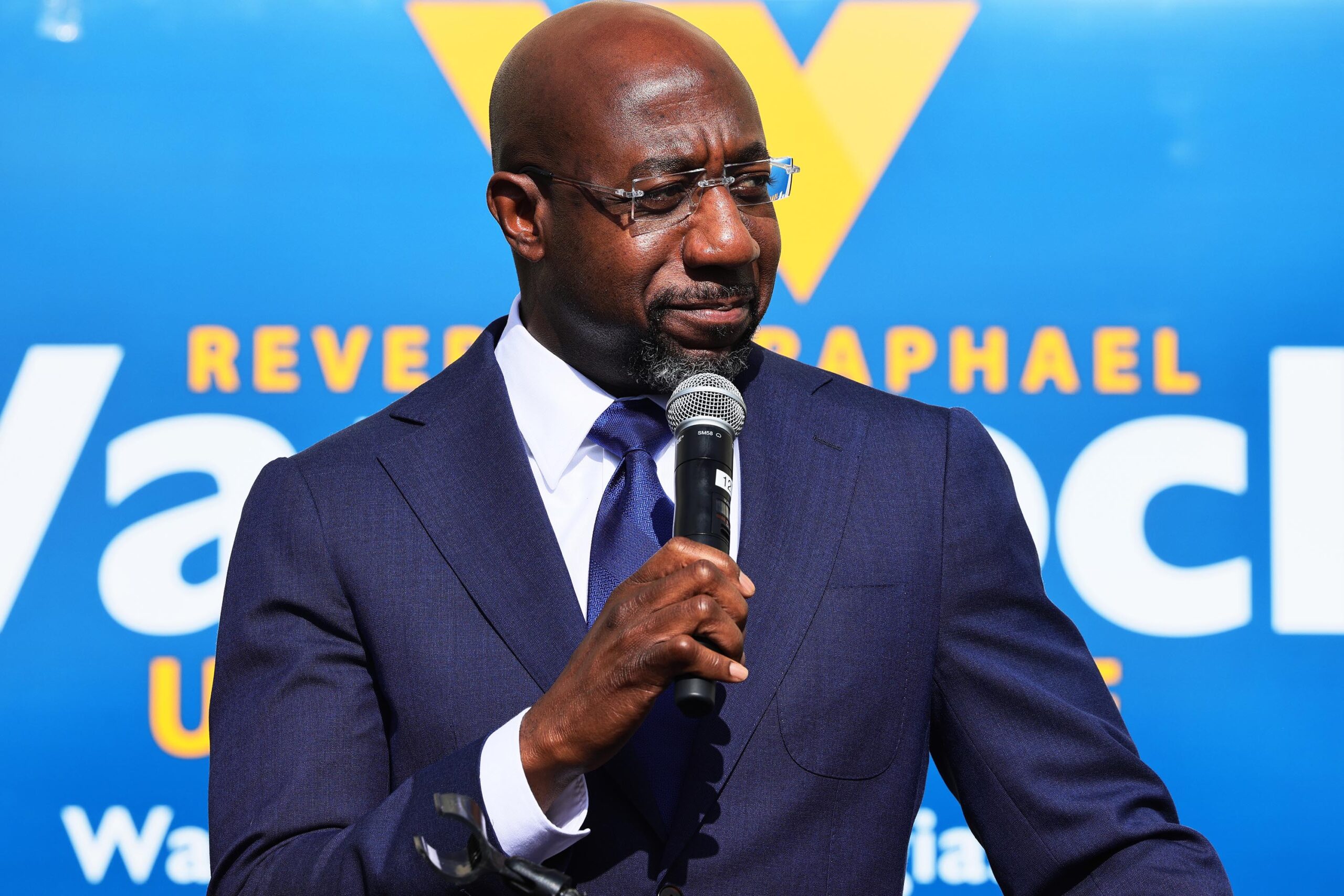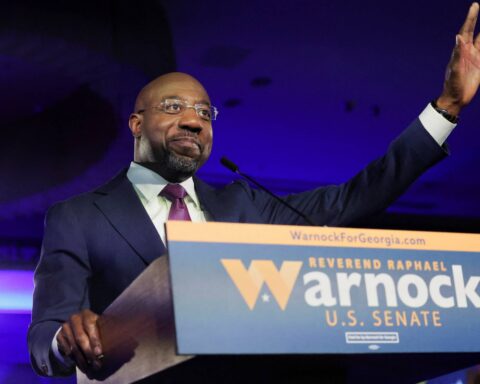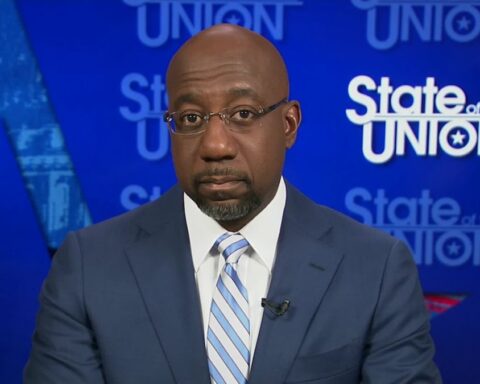Freshman Sen. Raphael Warnock, whose surprise victory in Georgia helped give Democrats the narrowest of majorities, now finds himself squarely in the center of an intensifying battle over tightening election laws and protecting the Senate’s filibuster — a debate that could directly affect his own chances of keeping his seat next year.
Republicans in Georgia are moving quickly to pare back many of the rules that eased access for voters in the 2020 election, with GOP lawmakers in the state pushing to finalize new restrictions before week’s end to ensure they take effect by next year’s midterm elections.
And in the Senate, Democrats are pushing ahead with a sweeping bill that would expand voting access across the country, a proposal that has the backing of 49 out of 50 members of the Democratic Caucus yet falls well short of the 60 needed to break a filibuster by Republicans — who contend the proposal is an effort aimed squarely at keeping Congress in Democratic control and helping vulnerable lawmakers like Warnock.
Now Warnock, a Baptist pastor and one of just three Black members of the Senate, is beginning to lobby his Democratic colleagues to gut the Senate filibuster so that a simple majority of senators can advance voting-rights legislation and eliminate the potent 60-vote threshold once and for all — but he faces several key Democratic skeptics.
On Monday night, Warnock made his appeal directly to President Joe Biden, pointing to the maiden speech he recently delivered in the chamber that highlighted minorities’ struggle for voting rights and arguing that the issue is more important than the Senate filibuster, according to a Democratic source familiar with the call. Warnock implored his colleagues to get behind the bill — and prodded the leader of his party as well.
Biden, the source said, responded by pointing to his executive actions on the issue, his past work on voting rights when he chaired the Senate Judiciary Committee — while also making clear that they need to win enough support in the Senate to get the bill through the chamber and continue to pressure Republicans. While he backed changes to make it harder to mount a filibuster, by forcing members to actually argue on the floor rather than simple threaten to stall legislation, the President has yet to throw his weight behind gutting the 60-vote threshold.
“No Senate rules can take priority over the foundation of the democracy itself,” Warnock told CNN shortly before the Monday night call. “One person, one vote. We have to find a way to preserve that.”
And Warnock downplayed the notion that the battle over voting rights could have direct ramifications on his own political future.
“I honestly think that the obsession with one’s own political fortunes is the reason why the democracy itself is imperiled by these craven unabashed tactics to win at any cost,” Warnock said.
Manchin not yet behind voting rights bill as Democrats lack votes to gut filibuster
Warnock and other proponents of the Democratic plan are running into roadblocks in the Senate — starting in their own caucus. Democrats lack the support to change the Senate rules on the filibuster and are at least several votes shy of the 51 votes needed to invoke the so-called nuclear option to allow a simple majority to advance legislation, a move that would have profound ramifications and give Senate majorities tremendous power to work their will over the minority party and resemble the majority-rules House.
West Virginia Sen. Joe Manchin, who has vowed to protect the institution in the name of his predecessor, the late Sen. Robert Byrd, has emerged as the leading Democratic proponent of keeping the Senate’s filibuster rules at a 60-vote threshold. He is the lone Democrat who has not signed onto the voting rights bill, telling CNN on Monday night that “there are a lot of good things in the bill that we can work on,” but added that “we have to do a bit of work” on it.
And he made clear again — as he has for months — that he won’t cave to pressure to lower the 60-vote threshold.
“Well, we have our differences on that,” Manchin said when asked about Warnock’s argument to gut the filibuster in order to approve the bill. “I sit in Robert C. Byrd’s seat.”
The conservative Democrat took umbrage at the suggestion that he doesn’t support expanding voting rights.
“I was the former secretary of state,” Manchin said. “No one fights for voters’ rights more than I do.”
Democrats’ sweeping voting bill, which passed the House largely along party lines earlier this month, would bar states from restricting the ability to vote by mail, expand access to early and mail-in voting and create an automatic voter registration for all eligible Americans, among many other provisions.
Republicans see the effort as an effort to impose federal control on elections that are conducted at the state level, arguing the approach would amount to a heavy-handed power grab to bolster their chances at the polls.
“That’s nothing but a pretense or cover for their real goal, which is to install a permanent Democratic majority,” said Sen. John Cornyn, a Texas Republican and member of his party’s leadership. “All you have to do is look at the turnouts in places like Georgia and Texas to see anybody who was legally qualified to vote, can vote. So this is all a false narrative.”
Even potential GOP swing votes are showing little appetite for the Democratic bill.
GOP Sen. Susan Collins of Maine said she opposed the bill in its current form, while Sen. Mitt Romney of Utah said it’s “very unlikely” he would support the bill.
“I don’t want to federalize the elections,” Romney, the Republican Party’s 2012 presidential nominee, said Monday. “That’s not what the Constitution demands, and I think states should have responsibility for conducting their elections.”
Democrats say the bill is imperative given what’s happening in GOP-led states across the country. Senate Democrats introduced the voting legislation, S.1., in part to counter Republican-led state efforts to restrict voting access in the wake of the 2020 election and former President Donald Trump’s unfounded claims of widespread voter fraud. But GOP proponents of the efforts say tightening rules are needed to prevent the potential for fraud, while saying such rules were loosened during the height of the Covid-19 pandemic and are no longer needed.
As of February, state legislators in 43 states had introduced more than 250 bills with restrictive voting provisions, according to a tally from the Brennan Center for Justice at New York University.
In Georgia, which Trump narrowly lost and later elected two Democratic senators in January’s runoff elections, Republicans are mounting one of the more aggressive efforts to tighten voting access.
Some of the restrictions that would be imposed include adding identification requirements for absentee voting, limiting the use of ballot drop boxes and disqualifying provisional ballots cast in the wrong precinct. The bill also would make it a misdemeanor to distribute food or soft drinks to voters who are waiting in line.
Georgia lawmakers say they are working to finalize changes to election bills in the coming days before the General Assembly adjourns next week.
Impact on Warnock race
Sen. Gary Peters of Michigan, who chairs the Senate Democrats’ campaign committee and will work closely with Warnock on his reelection, said he didn’t want to “speculate” about what the practical implications would be for Warnock’s race if the Georgia Legislature approves the changes.
“I always believe that democracy is served best when people are able to exercise their constitutional right in a free manner and one that makes it easy as possible,” he said.
Michigan Sen. Debbie Stabenow, a member of the Democratic leadership, was asked how critical passage of S.1. is to Warnock’s election. “I think it’s not only critical for Georgia, I think it’s critical, actually, for our whole democracy,” she said pointing to efforts in the Michigan Legislature to roll back no excuse absentee voting and other reforms adopted in 2018.
“The Republicans are trying to make it as hard as possible,” for Warnock to prevail, she added.
Ohio Democratic Sen. Sherrod Brown accused Republicans of trying to suppress votes because they can’t win on the appeal of their positions.
“I’m concerned that they’re doing it in Georgia, they’re doing it in Ohio, they’re trying to suppress the vote everywhere,” Brown said. “It affects Warnock, but it affects all of us, and it affects state legislative races.”
In his floor speech in the Senate, Warnock derided what he called a “massive and unabashed assault on voting rights” across the country by GOP-led legislatures “unlike anything we’ve ever seen since the Jim Crow era.” He said the Senate must find a way to pass voting rights whether they get rid of the legislative filibuster or not.
Pointing to what’s happened in his home state, Warnock said: “Did they ramp up their efforts over the last two months? Absolutely.”
Yet Republican Sen. Rick Scott of Florida, who chairs the National Republican Senatorial Committee, argued that Warnock would lose because of his political philosophy — not new voting laws in the state.
“Just changing the election laws isn’t going to keep anybody from being reelected,” added Sen. Chuck Grassley, the Iowa Republican who serves as ranking member on the Senate Judiciary Committee. Asked about the Democratic bill, the veteran Republican added: “If they’re changing it to get Warnock reelected, they’re doing it for the wrong purpose.”





